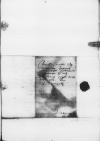Salutem.
Cuperem ex animo gratificari tibi, praesul ornatissime, sed non video, quo pacto possim praestare, quod cupis, diebus tam paucis quam Leuven (Louvain, Lovanium), city in the Low Countries, Duchy of Brabant, 25 km E of Brussels, University town from 1425, today in Belgium⌊hicLeuven (Louvain, Lovanium), city in the Low Countries, Duchy of Brabant, 25 km E of Brussels, University town from 1425, today in Belgium⌋ mansurus videris. Praeterea librum edere me absente vix video, quomodo commode fieri poterit. Opus est, quod ipse non ignoras, in quo praeclarissima quaeque Graecorum et Latinorum ingenia sudaverunt; quam feliciter, ipsi viderint. Quare non expediet meo iudicio emittere illud in publicum, nisi adhibita cura diligentissima. Quare si tibi videbitur, remittes illos quinquaginta una cum selectis illis, quos Kohelet (Ecclesiastes) ⌊EcclesiastaeKohelet (Ecclesiastes) ⌋ ascripsisti. Nam exemplaria illorum non invenio, ut eos recognitos prelo committam aut Cologne (Köln, Colonia, Colonia Agrippina), city in western Germany, on the Rhine river⌊ColoniaeCologne (Köln, Colonia, Colonia Agrippina), city in western Germany, on the Rhine river⌋ aut Paris (Lutetia Parisiorum, Parisii), city in central France, on the Seine river, capital of France⌊ParisiisParis (Lutetia Parisiorum, Parisii), city in central France, on the Seine river, capital of France⌋; nam decretum est mihi sedes mutare et in hanc regionem ad tempus relinquere.
Tu pro tua prudentia videbis, quid hac in re facere me velis; ad te enim res pertinet non minus quam ad me. Tuum enim est, qualecumque id est, et tuo nominem in prodibit, si prodierit in publicum. Quare te oro obnixissime, ut rescribere mihi quam primum non dedigneris, aut Gemma Frisius (Jemme Reinerszoon) (*1508 – †1555), Netherlandish leading theoretical mathematician and practicing physician in Louvain, scholar, and tutor of Gerardus Mercator, studied medicine, mathematics and astronomy at the University in Louvain (1526), where he became a professor of medicine and mathematics, he applied his mathematical expertise to geography, astronomy and map making (HALLYN; VAN ORTROY)⌊GemmamGemma Frisius (Jemme Reinerszoon) (*1508 – †1555), Netherlandish leading theoretical mathematician and practicing physician in Louvain, scholar, and tutor of Gerardus Mercator, studied medicine, mathematics and astronomy at the University in Louvain (1526), where he became a professor of medicine and mathematics, he applied his mathematical expertise to geography, astronomy and map making (HALLYN; VAN ORTROY)⌋ nostrum cum illis, quos habes, adhuc semel mea causa remittere huc digneris, ne forte, si alteri minus noto commiseris, codices, qui remittendi sunt superinscribed⌈suntsunt superinscribed⌉, intercidant.
Vale Domine mi.


 AAWO, AB, D. 6, f. 21v
AAWO, AB, D. 6, f. 21v